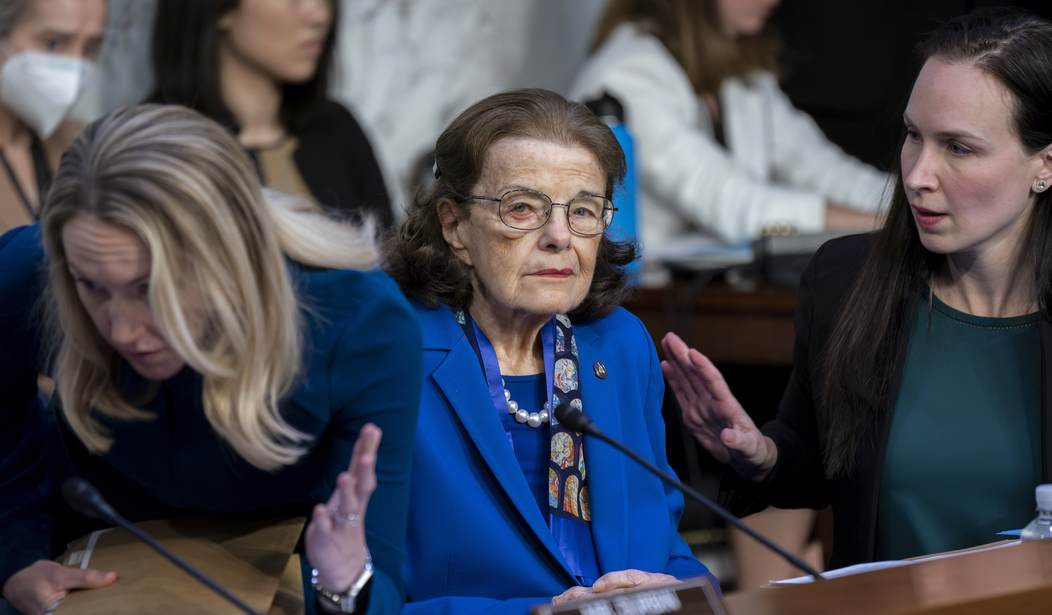Interested in buying a ring once owned by the late Sen. Dianne Feinstein (D-Emoluments)? Sorry, you can’t afford it.
In Los Angeles next month, the tony auction house Bonhams will present “Legacy of a Stateswoman: The Personal Collection of Senator Dianne Feinstein,” an auction of some of the far-left former senator’s possessions. Be sure to show up with a full checkbook, as you’ll likely have to plunk down as much as $100,000 for Irish/American painter William Alexander Coulter’s “Ships Sailing in the San Francisco Bay with Fort Point in the Distance.”
If that’s a bit rich for your blood, you could settle for a set of two paintings by the fifteenth-century Italian artist Neri Di Bicci, “Saint Sebastian” and “Saint Apollonia,” which you may be able to grab for $70,000, or, if it’s your lucky day and bidding is light, the low low price of only $50,000.
Then again, if fine art is not your thing, there is Feinstein’s platinum and diamond ring, “centering a round diamond weighing 4.14 carats, flanked by tapered baguette diamonds weighing approximately 0.50 carat total, size 8,” and yours for — again, if bidding is fierce — around $65,000.
Amid all this opulence, there are bargains galore. There is a pair of Chinese famille-rose “Phoenix” vases from the Guangxu period (1875-1908); they’re a real steal, as they’re expected to go for only six to eight grand.
This is, as the name of the auction informs us, Dianne Feinstein’s legacy: after a lifetime in government, she was a fantastically wealthy woman. And apparently, since Bonhams explicitly relates the exorbitantly priced baubles of her wealth to her political career, that is the message Feinstein or her estate wants to send to the American people: if you want to get rich, get into politics.
The biggest joke on the American people is that the people who serve in the U.S. government are still known as “public servants,” when in reality, they’re fattening themselves at the public trough and enjoying the fantastic perks that are otherwise accorded only to the extremely wealthy, all on the taxpayer dime. And with so many people around them willing to pay top dollar — all in strictly aboveboard ways, mind you! — for influence and access, it’s no wonder that so many politicians would become extremely wealthy themselves.
Historian and journalist Daniel Greenfield observes: “It’s funny just how insanely wealthy our ‘public servants’ are. This is the kind of thing you expect from European royalty, not former American government officials. But how much of a difference is there really?”
Virtually none at this point. And that is likely why the “stateswoman” Feinstein hung on so long, “serving” in the Senate from 1992 until her death in 2023 at age 90. “Public service” in the United States today is so comfortable and lucrative that people can’t bring themselves to surrender the reins of power once they get them. The reason why America is turning into a gerontocracy, with our government full of aged corruptocrats such as Nancy Pelosi and Old Joe Biden, is the same reason why five of the fifteen richest counties in the country are in Virginia and Maryland, right outside Washington, D.C.
Public service in the United States has become a lucrative exercise in mutual back-slapping, with numerous well-heeled lobbies eager to pay a cash-strapped congressman or senator outlandish speaker’s fees after he gets them what they want on the legislative floor. And once you’ve climbed aboard the gravy train, it’s hard to get off.
Related: Hey, Peasant, Kamala Harris Doesn’t Want You to Speak Without Her Permission
What would happen if the amount of money a politician could earn while in office were sharply curtailed by statute? I would wager that there would be an immediate sharp decrease in the number of elected officials who are over eighty. There would likewise be a steep decline in the number of elected officials whose fabulous wealth is put on display in a public auction after their deaths.
Meanwhile, it is kind of Bonhams to give us a glimpse of how “public servants” live in America today. Long ago, F. Scott Fitzgerald wrote: “Let me tell you about the very rich. They are different from you and me.” If there were a Fitzgerald among us today, he might write: “Let me tell you about the public servants. They are different from you and me.” It would amount to the same thing.










Join the conversation as a VIP Member